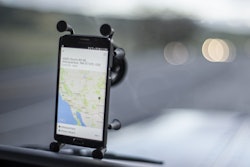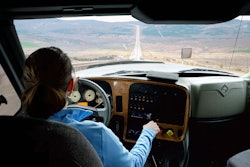Trucking technology may one day evolve to the point that the tractor can drive itself, but that is likely to come in small steps rather than giant leap.
Moderating a panel discussion at CCJ‘s Symposium in Asheville, N.C., Tuesday afternoon, Bishop Consulting Principal Richard Bishop says he first rode in an autonomous truck platoon in 1999, noting the technology itself isn’t new and many of the perceived obstacles in the way of autonomy are just that – perceived.
He says roads and highways don’t need to be changed or redeveloped to accommodate automation and vehicles don’t need to be connected to one another. New laws and regulations are not necessarily needed and vehicle sensors have come down in price, making sticker price less of a pain-point.
Peloton’s Chief Innovation Officer Dave Lyons says his company worked early on with lawmakers on regulatory needs, hoping to ease concerns before they flared.
“The federal government has told us that there are no barriers on the federal level,” he says, noting several states have also passed legislation to allow platooning on various levels.
The uniqueness of the onslaught of today’s technology, Bishop says, isn’t as much about taking the driver out of the truck as it is about allowing drivers to focus on other aspects of their job.
“Nothing has ever been done for vehicles that allows divers to do something else with their brain,” he says. “That’s what changes everything.”
“In the next 5 to 10 years, we’ll see more technology than we’ve seen in probably the last 50 years,” added U.S. Xpress Executive Chairman Max Fuller.
But that evolution has come, and will come, with a cost. The proliferation of autonomous technology, Fuller says, has kept would-be drivers from entering the industry out of fear that autonomy could wipe out jobs. Another hurdle facing autonomy comes from those with whom drivers share the road.
Fuller says public sentiment, which in general doesn’t favor trucks in bunches, will need to change.
“You’ve got to get the public to buy into it,” adds Mike McHorse, Freightliner Trucks’ on-highway product marketing manager.
Another hurdle specific to platooning is how to trade off the benefits between the lead driver – a fuel economy improvement of about 4.5 percent – and the trailing driver – a roughly 10 percent improvement.
Most truck OEMs are testing autonomy on some level and third-party companies like Otto, Embark and Starsky Robotics have each this year tested retro-fit units. However, Fuller says he’s skeptical of aftermarket autonomy.
“I want it integrated into the truck,” he says.
“These trucks,” adds McHorse, “they’re just so sophisticated.”
Full automation is likely to add upwards of $40,000 to the purchase price of a truck, but Fuller says it won’t come in one indigestible chunk.
“It’s going to come in pieces,” he says. “Disc brakes, collision avoidance … I’ll get there slowly. The building blocks come in those pieces. Each year, I probably spend $4,000 to $6,000 more [per truck] to get those pieces and eventually I’ll get to Level 5 [autonomy].”
When U.S. Xpress hits Level 5 autonomy, Fuller says he doesn’t envision taking the driver out of the truck.
“They do a lot more than just hold the steering wheel,” he says.
The truck’s capability to drive without a driver isn’t the only innovation facing the industry as companies like Tesla and Nikola Motor Company work to introduce alternative electric powertrains, which offer better control than diesel models.
“The missing link in commercial vehicles is you don’t have electric power steering,” Lyons says.











